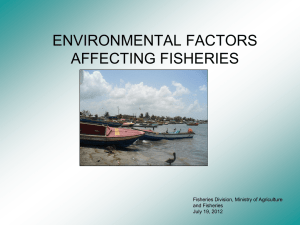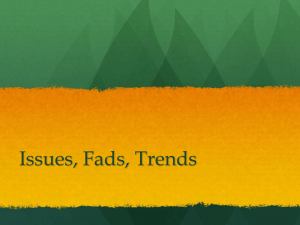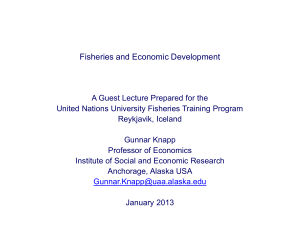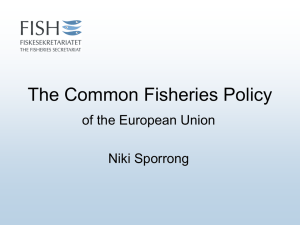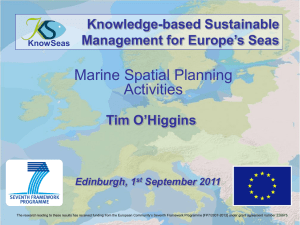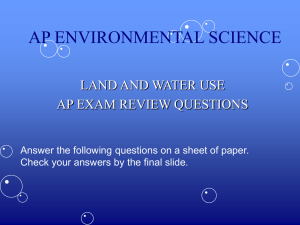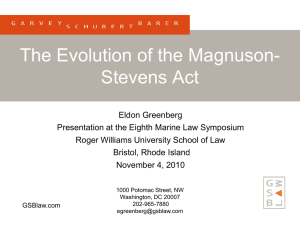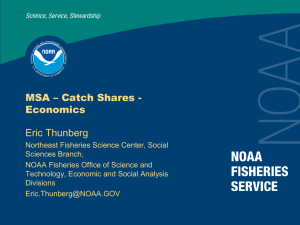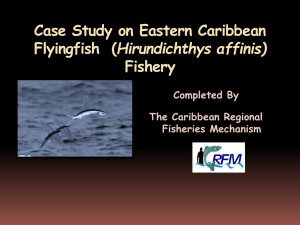Information Note (Revised) CARIFICO Workshop
advertisement
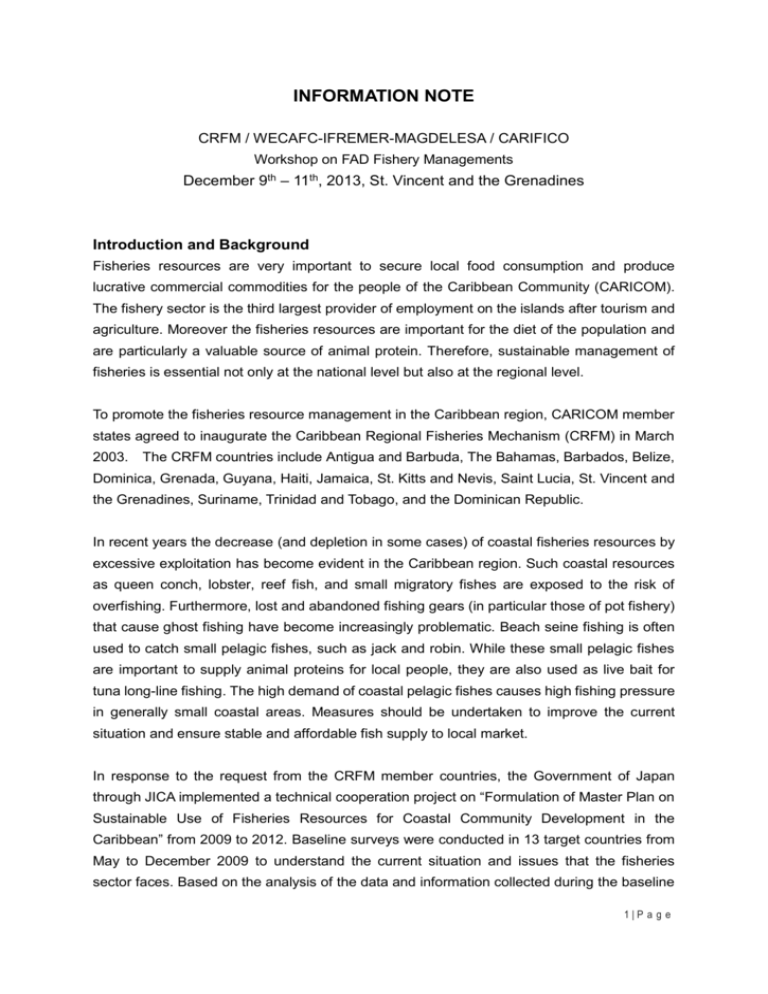
INFORMATION NOTE CRFM / WECAFC-IFREMER-MAGDELESA / CARIFICO Workshop on FAD Fishery Managements December 9th – 11th, 2013, St. Vincent and the Grenadines Introduction and Background Fisheries resources are very important to secure local food consumption and produce lucrative commercial commodities for the people of the Caribbean Community (CARICOM). The fishery sector is the third largest provider of employment on the islands after tourism and agriculture. Moreover the fisheries resources are important for the diet of the population and are particularly a valuable source of animal protein. Therefore, sustainable management of fisheries is essential not only at the national level but also at the regional level. To promote the fisheries resource management in the Caribbean region, CARICOM member states agreed to inaugurate the Caribbean Regional Fisheries Mechanism (CRFM) in March 2003. The CRFM countries include Antigua and Barbuda, The Bahamas, Barbados, Belize, Dominica, Grenada, Guyana, Haiti, Jamaica, St. Kitts and Nevis, Saint Lucia, St. Vincent and the Grenadines, Suriname, Trinidad and Tobago, and the Dominican Republic. In recent years the decrease (and depletion in some cases) of coastal fisheries resources by excessive exploitation has become evident in the Caribbean region. Such coastal resources as queen conch, lobster, reef fish, and small migratory fishes are exposed to the risk of overfishing. Furthermore, lost and abandoned fishing gears (in particular those of pot fishery) that cause ghost fishing have become increasingly problematic. Beach seine fishing is often used to catch small pelagic fishes, such as jack and robin. While these small pelagic fishes are important to supply animal proteins for local people, they are also used as live bait for tuna long-line fishing. The high demand of coastal pelagic fishes causes high fishing pressure in generally small coastal areas. Measures should be undertaken to improve the current situation and ensure stable and affordable fish supply to local market. In response to the request from the CRFM member countries, the Government of Japan through JICA implemented a technical cooperation project on “Formulation of Master Plan on Sustainable Use of Fisheries Resources for Coastal Community Development in the Caribbean” from 2009 to 2012. Baseline surveys were conducted in 13 target countries from May to December 2009 to understand the current situation and issues that the fisheries sector faces. Based on the analysis of the data and information collected during the baseline 1|P a g e surveys, a preliminary master plan was produced and potential pilot projects were identified in February 2010. Fishing Aggregating Device (FAD) Pilot projects were implemented in Dominica and St. Lucia during 2010/2011, aquaculture Pilot activities in Jamaica and Belize, and Fishery Statistical pilot projects were implemented in St. Vincent and the Grenadines and Guyana. The FAD Pilot Project implemented during the development of the Master Plan confirmed that diversification of coastal fishery using FADs has great potential and can be used as a tool to involve fishers and their organizations in the sustainable use of large pelagic fishery resources. However, unregulated and excessive number of FADs may cause overexploitation of large pelagic fishes which could reduce the economic advantage of having such devices. Properly managed and regulated use of FADs is a basic requirement for their introduction in the region. Since fisheries policy and resource management plans and budget structures are not properly developed and in place at the national level and no joint regional management systems are in place for the coastal pelagic and other shared resources, there is some concern that these resources could become overexploited. To address this issue, a multinational master plan for fisheries resource management and development is needed. The Final Report of the Master Plan proposed (1) to establish practical co-management models for sustainable use and management of the fisheries resources, (2) to promote participatory resource management and development toward co-management, and (3) to formulate and strengthen the regional network by sharing the local expertise and lessons learned in each country. In March 2013, the CRFM and JICA jointly organized the FAD Fishery Management Workshop as a follow-up to the Master Plan FAD pilot activities. The purpose of the workshop was to review and share research results and best practices in the construction, use and management of FADs as tools for sustainable development, management and conservation of large pelagic resources in the region and to consider the CARIFICO project proposal for the way forward. The Caribbean Fisheries Co-management Project (CARIFICO) was implemented on 1st of May, 2013. CARIFICO is a joint collaboration between the CRFM member countries, CRFM Secretariat, and JICA. The project intends to develop and implement suitable fisheries co-management approach in six (6) OECS countries, and appropriately share achievements and lessons learnt with other CRFM member states. 2|P a g e The Western Central Atlantic Fishery Commission (WECAFC), established in 1973, provides regional fishery management advisory services to all Caribbean states and includes amongst its 32 member countries also the overseas territories of France, Netherlands and the United Kingdom, as well as Japan and the European Union. In 2011 the French Research Institute for Exploration of the Sea (IFREMER), assisted by WECAFC and financed by INTERREG European funds initiated the Moored fish Aggregating Devices in the Lesser Antilles and Haiti (MAGDELESA) project. The MAGDELESA (Moored fish AGgregating DEvice in the LESser Antilles) project is an experimentation of a systemic and participative approach to reach sustainable development of large migratory fish’s exploitation. The project is led by IFREMER and partners with the Fisheries divisions of Grenada, St Vincent, Dominica, the Department of Fisheries of St Kitts, the Direction des Pêches of Haiti, PLK Marine Enterprise, Impact Mer, CRPMEM (Committee on Fisheries and Aquaculture Marine) of Guadeloupe, UBO (University of Bretagne Occidentale - UMR AMURE), the PARM (Pôle Agroalimentaire Régional de la Martinique), Institut Pasteur de Lille and Prevention Maritime Institute (IMP). The main objectives of MAGDELESA are: The redeployment of the overfishing of the coastal resources (primarily fauna of the coral reefs) towards the pelagic high-sea species (tunas and similar) that still provide a reasonable possibility for catches, by the use of FAD (Fish Aggregation Device). The research on the conditions of development of sustainable fishing on the shared pelagic resources and of maintenance of the activity away from the island shelf and the associated coral ecosystems, with FAO, the Lesser Antilles and Haiti. Develop together with the scientific teams and fisheries managers in the Lesser Antilles and Haiti an integrated and participative approach on the sustainable and responsible development of the blooming anchored FAD fishing in the zone. The MAGDELESA project results from activities undertaken within the framework of the WECAFC Working Group on Development of Sustainable Moored Fish Aggregating Device (FAD) Fishing in the Lesser Antilles. This group is focused on the sustainable management and development of moored FADs fishing in the Lesser Antilles and in Haiti, and aims at supporting conservation, managing as well as sustainable and concerted valorization of the biodiversity of the coastal areas and natural marine resources. Hence, in undertaking its work, the working group pays due attention to the conservation and management of large pelagic fisheries in the WECAFC Region and related or interacting species or fisheries. The working group also takes a multidisciplinary approach to the sustainable development of moored FAD fishing for large pelagics. 3|P a g e In 2011 and 2012 the MAGDELESA project successfully deployed FADs in Dominica, Grenada, St. Kitts, and St. Vincent. Workshop Organizers The CRFM with funds from CARIFICO will organize and implement the CRFM/ WECAFC-IFREMER-MAGDELESA /CARIFICO regional workshop December 9 – 11, 2013 in St. Vincent and the Grenadines. In light of the overlapping aims of the MAGDELESA project and this project’s closure at the end of October/November, 2014, the proposed joint workshop provides an opportunity to transfer knowledge and experiences, consolidate linkages among existing networks for FAD Fishery management, and also importantly, discuss the future of the IFREMER/WECAFC Working Group on Development of Sustainable Moored Fish Aggregating Device (FAD) Fishing in the Lesser Antilles. Planned activities for this event are listed under appendix 1. 4|P a g e Schedule and target participants Scheduled date: December 9th – 11th, 2013 Venue: Methodist Church Hall, Kingstown Participants: National Fisheries Authorities representatives from: Antigua and Barbuda, Barbados, Belize, Dominica, Grenada, Guadeloupe, Guyana, Haiti, Jamaica, Martinique, St. Kitts and Nevis, St. Lucia, St. Vincent and the Grenadines Suriname, and Trinidad and Tobago. Senior representatives from key regional and international fisheries related organizations involved in FAD fisheries management activities such as Caribbean Caribbean Network Resource of Fisheries Mechanism (CRFM), Fisheries Organization (CNFO), Japan International Cooperation Agency, MAGDELESA, WECAFC/UN-Food and Agriculture Organization (FAO); UWI, Florida University. Objective The objectives of the Workshop are to: Review and share research results and best practices in the construction, use and management of FADs as tools for sustainable development, management and conservation of large pelagic resources in the region. Discuss future work plans and action plans for the countries directly involved in the implementation of field activities under the CARIFICO Project. Present the findings and recommendations from the EU-funded MAGDELESA project. Prepare recommendations to WECAFC and CRFM on FAD use in fisheries and the management of FAD fisheries. 5|P a g e Appendix 1 Draft Agenda/Structure Workshop will feature presentations from six CARIFICO participating countries and other CRFM member countries; key experts representing CRFM, MAGDELESA, JICA, and WECAFC/FAO. There will also be plenary discussions as required. General format is as follows: 1. Country Presentations Updated country reports, for period March 2013 – current. (see Appendix 2) Work plans for 6 CARIFICO participating countries Action Plans for CARIFICO developed during recent training in Okinawa, Japan 2. Organization Presentations CRFM: Updated information of CRFM MAGDELESA: Updated information of MAGDELESA CARIFICO: Updated information of CARIFICO UN-FAO: Updated information of WECAFC Working Group UWI: Florida University: CNFO: 3. Technical Discussions A. FAD technology Design of the FAD by CARIFICO (Ishida, JICA) Demonstration of FAD software – Comparative effects of rope diameter, length, and buoys volume against the currents (MAGDELESA). Observation of the currents from FADs equipped with GPS (P. Gervain, MAGDELESA) Comparative presentation of different types of FADs (P. Gervain, MAGDELESA) Analysis of work and of safety conditions in anchored FAD fishing (Y. Le Roy, MAGDELESA) B. Co-management Okinawa experience for FAD fisheries co-management (Nariaki Mikuni, JICA) Collection of data on active fishers, their catch and fishing effort (JICA Volunteer) FAD management system in Martinique and Guadeloupe (K. Frangoudes, MAGDELESA) 6|P a g e Are there FADs specialized fishers in Martinique? A thought about integrated management and FADs appropriation (J. Timor, MAGDELESA) Exploring fishers behaviour around moored FADs (O. Guyader, MAGDELESA) C. Marketing Quality of product fished around FAD: Preliminary results (C; Dromer & F. Regina, MAGDELESA) Experience with Tuna Export to the United States ( presenter, Fishisle Spice House, Grenada) Fishing strategies, economic performance of small scale FADs fleets in Guadeloupe (O. Guyader, MAGDELESA) D. Fishery Resources Reproduction of Black fin tuna: Preliminary results (C. Pau, MAGDELESA) FADs fishing redeployment toward high sea resources and its impact on coastal species (H. Mathieu, MAGDELESA) CRFM: Present status of fish resources targeted by FAD and their management E. Management Recommendations and resolutions on FADs (L.Reynal/R.van Anrooy, WECAFC, CRFM) Summary of conclusions and recommendations. Preparation of (non-binding) management recommendations or a resolution for review and consideration by WECAFC and CRFM. F. Way Forward (L. Reynal, IFREMER) The transformation of the IFREMER/WECAFC Working Group on FADs into a joint JICA/IFREMER/CRFM/WECAFC Working Group on FADs Terms of Reference Confirmation of the Convener for Working Group Website hosting and management Working Group Work plan for 2014 -2015 7|P a g e Contacts / correspondence Logistical arrangements will be handled by the CRFM Secretariat CARIFICO, therefore general enquiries, nomination of your national delegations - including formal titles/positions of persons, should be directed to the addresses mentioned below. All communications should be handled via email. CRFM Secretariat: secretariat@crfm.int Tel: 501-223-4443 Fax: 501-223-4446 8|P a g e Appendix 2 Country report format 1. Outline of FAD fisheries 1. History of FAD fisheries 2. Position, structure and owner of existing FADs 3. Number of fishing vessel and fishermen using FADs and the communities they belong 4. Species and volume of the catch by FADs 5. Fishing practice by FADs 6. Landing place and marketing of the catch by FADs 7. Profit generated by FADs fishermen 2. Registration & license 1. Related laws and regulations for registration and license of fishing vessel and fishermen 2. Benefits for fishermen to be registered and licensed 3. Penalties to fishermen not to be registered 4. Application for registration and licensing 5. Checking qualification, vessel inspection 6. Collection of fee 7. Issuing ID, issuing registration certificate, displaying Reg.No 8. Renewal of registration and license 3. Rules and regulations for FAD fisheries management 1. Articles of the Fisheries Act and regulations for FADs fisheries management 2. Qualification for access to FADs 3. Rules for deployment of FADs 4. Rules for fishing around FADs 5. Rules for maintenance of FADs, Collection of fee 6. Participation by fishermen in the formulation of the rules 7. Penalties to violation, self-regulatory mechanism by fishermen 8. Coordination with related sectors such as tourism, environment and marine transportation, Fishery Advisory Committee 9. Authorization by the Minister for legislation 4. Catch & Effort data 1. Collection by Data collector 2. Utilization of Market data 3. Verification and validation 4. Organizing the fishery statistics and their utilization 5. Stock assessment/evaluation of the status of the resources 9|P a g e 5. Fishermen’s organization 1. Types of organization and its history until their establishment 2. Organizational structure, By laws, General meeting, Directors, Staff, Legal status 3. Accounting and audit, Support and supervision by the Fisheries Div. and Cooperative Div. 4. Business, Fish marketing, Sailing ice, fuel and fishing gear, Fish Night 5. Consensus building among fishermen for fisheries management 6. Fisheries center 1. Services provided by the facility 2. Management of the facility 3. Collecting user fee 4. Maintenance of the machine and facility and their financial source 7.Government measures for increasing fishermen’s incentives to the co-management Country Monitoring Sheet (quantitative) To monitor the progress of the CARIFICO, the following data should be collected throughout the project period. (May1, 2013 – Apr30, 2018) Number/list of the captains who starts 1st yr 2nd yr 3rd yr 4th yr ends Operates FAD fishing Participates into fishermen’s consultations Pays the maintenance fee Records the catch and effort data in the logbook Utilizes the services provided from the fisheries center/fisheries cooperatives Is a member of the fisheries cooperatives Gets the fishing boat inspected and registered Is registered and holds ID 10 | P a g e Relies on other fishermen Relies on the fisheries cooperatives/association Relies on the fisheries department/division 11 | P a g e
